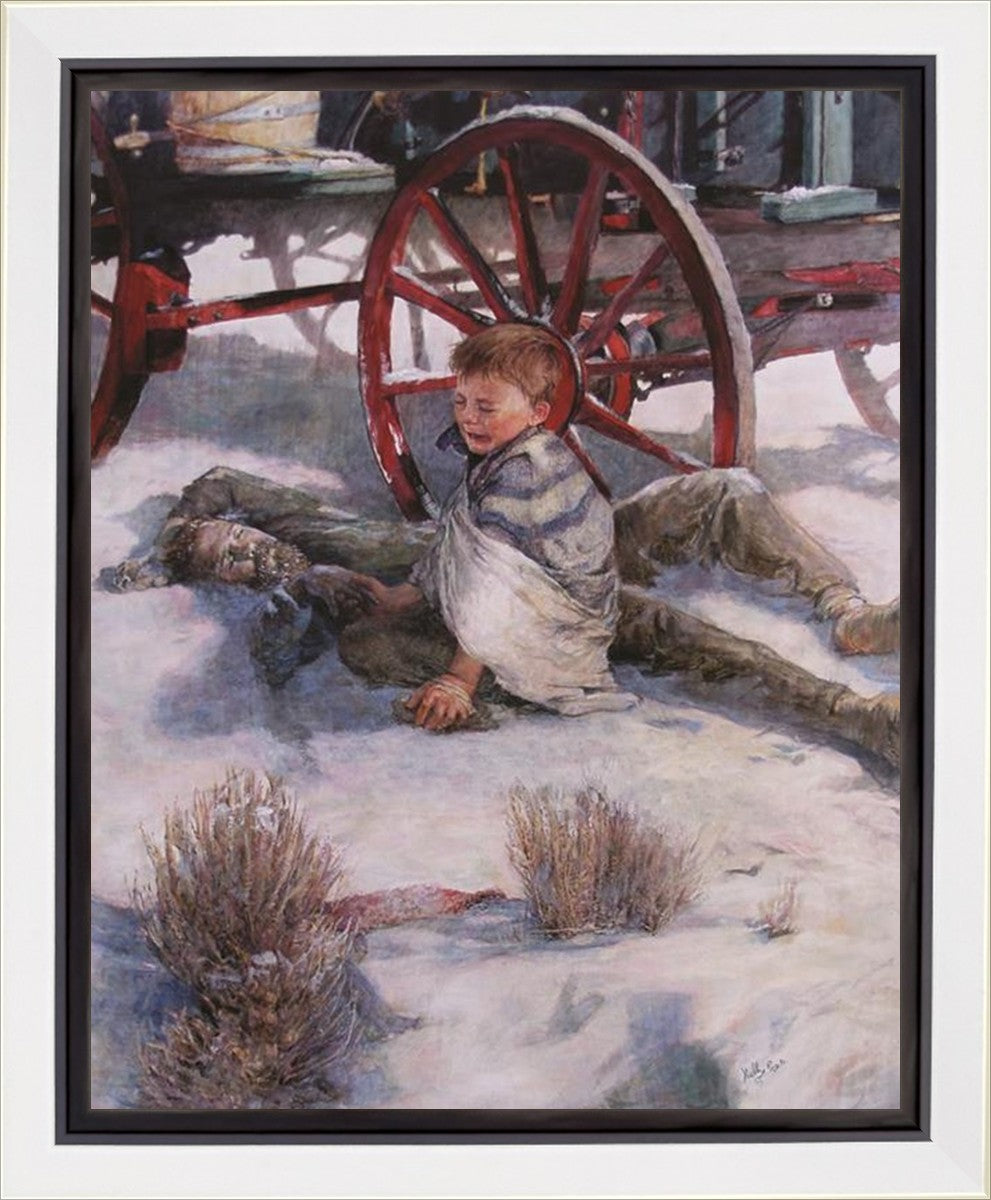Oh Father, Oh Father
Oh Father, Oh Father
SKU:KP1023142
Art Story
Art Story
Sunday, October 19,1856, Between the Last Crossing of the Platte and Red Buttes, Martin Company, Heber R. McBride Journal. We had to ford all the rivers but one and that was the Loupe Fork of the Platte but the evening we crossed the Platte for the last time it was very cold and the next morning there was about 6 inches of snow on the ground and then what we had to suffer can never be told. Father was very bad this morning-could hardly sit up in the tent we had to travel that day through the snow. I managed to get Father into one of the wagons that morning and that was the last we ever saw of him alive we only made one drive as it began snowing very hard when we camped the snow was getting deep and my sister and me had to pitch our tent and get some wood but that was handy as there was plenty of dry willows on the bank of the river. After we had made Mother as comfortable as we could we went to try and find Father but the wind was blowing so bad that we could not see anything and the wagons had not got into camp and it was then after dark so we did not find him that night and the next morning the snow was about 18 inches deep and awful cold but while my sister was preparing our little bite of breakfast I went to look for Father and at last I found him under a wagon with snow all over him and he was stiff and dead. I felt as though my heart would burst. I sat down beside him on the snow and took hold of one of his hands and cried oh Father, Father. There we was away out on the Plains with hardly anything to eat and Father dead and mother sick and a widow with 5 small children and not able to live from day to another. After I had my cry out I went back to the tent and told Mother. Now to try and write to tell the feelings of Mother and the other children is out of the question. Now we were not all the family that was called upon to mourn the loss of a Father this morning for there was 13 men dead in camp. The men that was able to do anything cleaned [oft] the snow and made a fire and thawed out the ground and dug a big hole and buried them in one grave some side by side and on top of one another-any way to get them covered for I can assure you that the men had no heart to do any more than they had to. We never knew how Father died whether he died in the wagon and was lifted out or he got out himself and fell down exhausted and froze to death. I don't know how many days we had to layover for the snow was so deep that we could not pull our handcarts through and
there we were in a starving condition and the oxen that pulled the wagons began dying but everyone [the oxen] that died was devoured very quickly and us little boys would bet strips of rawhide and try and eat it all. The [only] way they could do anything with it was to crisp it in the fire and then draw a string of it through our teeth and get some of the burnt scales off that way and then crisp it again and repeat the operation [till] we would get tired.
About the Artist
About the Artist
Kelly Pugh has always and will always love to draw and paint the world around him as well as the people, and wildlife alive today and in the past.
Kelly's experience as a full-time artist has enabled him to paint in many different kinds of medium, subject matters, and materials. He has published several books and is currently working on a book of the Martin and Willie Handcart companies. He is doing this book along with author Shelli Simmons author of the stories listed on this site.
Kelly's experience as a full-time artist has enabled him to paint in many different kinds of medium, subject matters, and materials. He has published several books and is currently working on a book of the Martin and Willie Handcart companies. He is doing this book along with author Shelli Simmons author of the stories listed on this site.
Shipping & Returns
Shipping & Returns
If your order has a time sensitivity that requires expedited shipping, please Contact Us so that we can confirm our ability to meet your time requirements.
Many of the items on our site are custom made or built to order, especially framed items. A shipping time requested as "2-Day Priority Mail" refers to the shipment time once the item has shipped and does not include any assembly window. We pride ourselves on our efficient and timely system, but the complexity of an order will impact delivery. Orders to Hawaii may take 3-4 weeks to arrive via USPS. If you need your order sooner, please reach out to customerservice@ldsart.com.
For more information, please refer to the following policies:
Couldn't load pickup availability






























